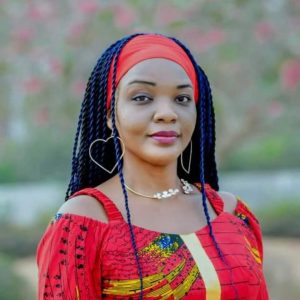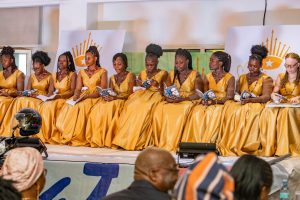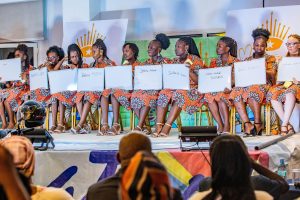 Cameroon : Dr. Yasmine Ndassa, the research scientist turned data storyteller
Cameroon : Dr. Yasmine Ndassa, the research scientist turned data storyteller
 Julien Ngum Che : advocating for the rights of displaced women and youth in Cameroon
Julien Ngum Che : advocating for the rights of displaced women and youth in Cameroon
 Chilufya Mutale Mwila, the Zambian entrepreneur driving financial inclusion across Africa
Chilufya Mutale Mwila, the Zambian entrepreneur driving financial inclusion across Africa
 Wangari Muchiri, the Kenyan engineer committed to accelerating the ecological transition in Africa
Wangari Muchiri, the Kenyan engineer committed to accelerating the ecological transition in Africa


From Brazzaville, where she has been living and working for the past year and a half at the headquarters of the African Petroleum Producers Organization (APPO) as communications officer, Toudonou Carmen Fifamè, a Beninese journalist, researcher, author, and blogger, continues to oversee the organization of « Miss Literature ». A pan-African literary competition that she initiated in 2016 to promote reading and writing among young African girls. This year, the final of the competition will take place on July 26 in Cotonou, Benin.
If there is one area in which Toudonou Carmen Fifamè has a particular interest, it is undoubtedly literature. She discovered her passion for reading and writing at a very early age, even while studying science at high school. With a high school diploma in mathematics under her belt, she dreamed of studying journalism instead. “At the time, there was no journalism school in Benin. You had to go to Dakar, Senegal, to study journalism. I couldn’t afford it,” she explains to Africa Women Experts. She finally settled for a degree in business management and immediately began her professional career in communications. But a few years later, a journalism school opened in Benin. It was the opportunity she had dreamed of. She enrolled and earned a professional degree in journalism, as well as a master’s degree, a DEA in communications and linguistics, and later a doctorate in social communications.
From Journalism to APPO, via the National Assembly of Benin
She began her journalistic career at the Benin Radio and Television Office (ORTB), now SRTB, where she spent eight years working both as a radio and television journalist. In 2015, she left the media world for institutional communications. She joined the National Assembly of Benin, where, for eight years, she held the positions of Television Project Manager, Head of Television Services, and Head of the Chamber’s Communications Department, as well as Deputy Director of the Parliamentary Institute, a research organization for the parliament.
Determined to take on new challenges, she embarked on an international career. After a brief stint at the National Conference of Ministers of National Education of the Francophonie, she joined the African Petroleum Products Organization (APPO) in January 2024, headquartered in Brazzaville. She is responsible for managing communications of this pan-African organization which brings together 18 African oil and gas producing countries, as well as Venezuela as an honorary country.
“Miss Literature”: Promoting Writing and Reading Among Young African Women
While pursuing her career in media and communications, she devoted herself to her passion: literature. She published several books, founded a publishing house, and, most importantly, initiated the “Miss Literature” competition. This competition targets young African girls aged 18 to 24 and aims to encourage them to read and write.
It was her experience with beauty contests that gave her the idea to create “Miss Literature.” In 2004, she participated in Miss Malaïka, a competition in which she came runner-up and which left a lasting impression on her. Two years later, she created “Miss & Mister Kitoko.” “It was a beauty pageant that emphasized the intellectual aspect. But after two editions, we stopped. I didn’t have enough resources and I was very young at the time,” she confided to Africa Women Experts.
In 2016, she launched a new contest, this time focused on literature, which she called “Miss Literature.” “I had taken my thinking a step further. I realized, among other things, that beauty contests are a remnant of patriarchy and that they contribute to the objectification of women. So I decided that we would focus the contest on the intellectual aspect, but draw inspiration from the glamour and elegance of beauty contests to promote literature, because it is often unfortunately perceived as a daunting field,” she confides. Through the contest, “the goal is to show that a girl who is interested in literature is not uncool. She is a girl like any other, but with one advantage: a love of literature,” she continues.
A Pan-African Competition


After two national annual editions in 2016 and 2017, “Miss Literature” has been a biannual pan-African competition since 2018. For this edition, ten French-speaking African countries will participate in the competition final, which will take place on July 26 in Cotonou, Benin, including Senegal, Guinea, Cameroon, Burkina Faso, Congo, Ivory Coast, Mali, Togo, and Chad. After the first stage, which saw the election of the national Miss from each of the 10 countries, the African final will be held in a few days’ time, bringing together the ten national winners for a week in Cotonou. “During this final, the candidates will participate in four tests, including public speaking (or original presentation), answering questions on literature, writing, and a literary review of a set novel,” she explains. The jury will then select Miss Literature Africa, as well as her two runners-up. The winner will receive, among other things, a publishing contract for her first book, which will be released during the next edition of Miss Literature in 2027.
Alongside the competition, a scientific symposium will also be held on Friday, July 25, on the theme of “Creating Literature in the Age of AI,” which will be attended by several researchers, as well as the 10 winners of the competition, who will participate for the first time with presentations on the theme of the Biennale.
An author denouncing the human condition in Africa
With a dozen works to her name, including novels, short stories, poetry, and children’s books, Carmen Fifamè uses her pen as a tool for reflection on the human condition in Africa. “What I try to do through the various works I write is to talk about this Africa, my Africa, that I know. I make an effort not to be chauvinistic. The idea is not to say that everything is rosy in Africa. Nor is it to demonize the continent. It is about presenting a fair image of Africa,” she explains. Her book Carmen Fifonsi Aboki (CFA): Collection of Short Stories, published in 2018, which, like her other works, deals with the realities of African societies, addresses the woes of a society in decline, but also tells stories of daring and boldness. In 2020, it was selected for the Ahmadou Kourouma Prize at the Geneva Book Fair.
Her latest novel, Paria, published in July by her publishing house Venus d’Ebène and by My African Cliche, a Kenyan publishing house, addresses the subject of the slave trade in East Africa. It is a forgotten historical fact that the author seeks to bring to light. “This novel is about slavery, which contributed to the capture and deportation of Africans to the East: Africans who were taken to Turkey to serve in harems and who were exploited on plantations and in quarries. It’s a subject that isn’t talked about. Some were castrated to serve in Eastern harems. Women were deported to serve as sex slaves,” she explains.
Editor, author, cultural promoter, and president of the association “Peace for Children and Youth,” founded in 2004 in memory of her daughter, Carmen Fifamè combines all her efforts to tell the story of Africa differently and build a typically African imagination for its youth. Today, her ambition is to see the “Miss Literature” contest embrace more countries and expand to English-speaking, Portuguese-speaking, and Spanish-speaking countries…
Danielle France Engolo